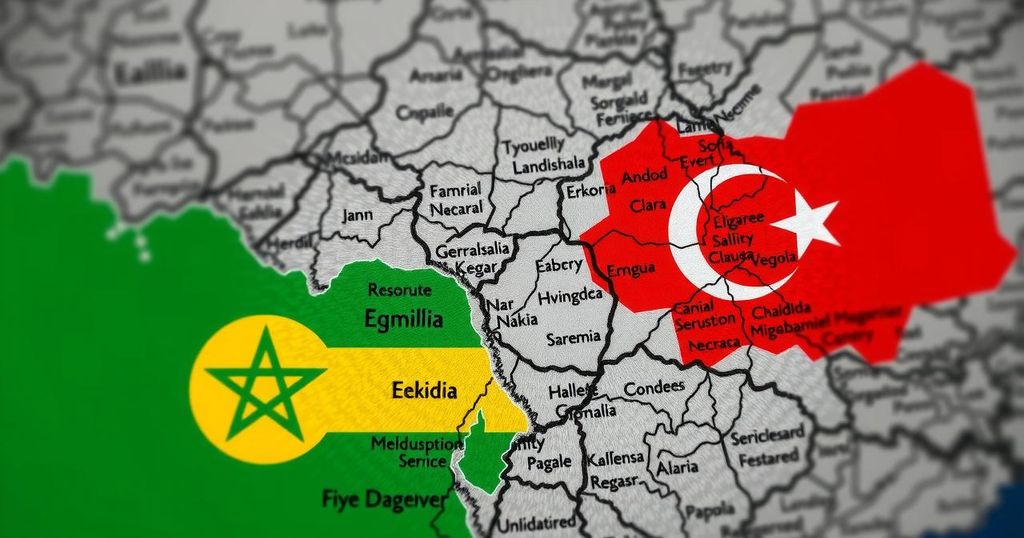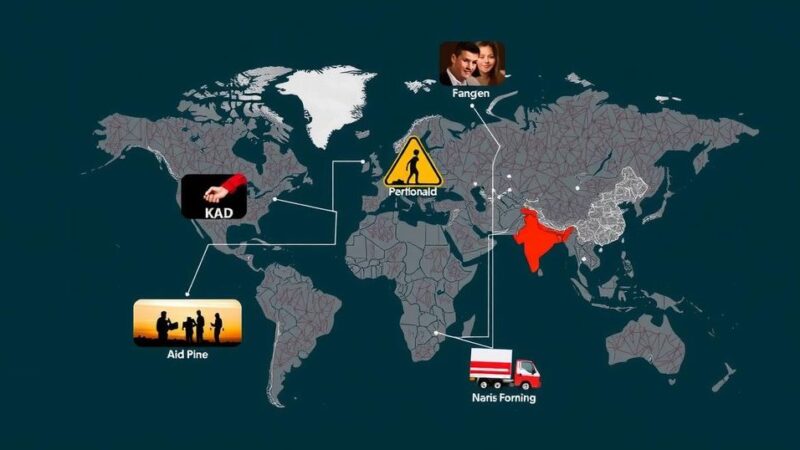Turkey is mediating tensions between Somalia and Ethiopia following a controversial MoU that undermines Somalia’s territorial integrity. Turkey’s diplomatic role leverages its strong ties with both countries to promote regional stability. However, entrenched positions and Ethiopia’s ambitions for maritime access pose significant challenges to resolving the dispute.
Turkey is actively engaging in shuttle diplomacy to mediate tensions between Somalia and Ethiopia, primarily a response to a Memorandum of Understanding (MoU) established between Somaliland and Ethiopia in January 2024. Given Turkey’s long-standing diplomatic ties with both nations, it is positioned as a credible mediator in this conflict. Moreover, Turkey has invested significantly in fostering stability within the Horn of Africa, particularly through military support to both Somalia and Ethiopia, demonstrating its commitment to peace and security in the region. During the second round of talks, Turkey’s Foreign Minister, Hakan Fidan, emphasized Turkey’s commitment to addressing the concerns of both countries while benefiting the region at large. However, the contentious sea dispute and the entrenched positions of Somalia and Ethiopia make finding common ground exceedingly complex. The geopolitical dynamics are shifting in the Horn of Africa, affected by various regional interests, as outlined by scholar Tunç Demirtaş. Notably, the Horn is sensitive to violence and instability, and Turkey’s mediation efforts are crucial in maintaining peace. Yet, the recent conflicts in Somalia and Ethiopia, exacerbated by the Somaliland-Ethiopia MoU, pose significant challenges. The emergence of Prime Minister Abiy Ahmed in Ethiopia was initially met with optimism in 2018, promising change and reform. However, the internal conflicts, particularly the violent confrontations in the Tigray and Amhara regions, have undermined those early hopes. Scholars have noted that Ethiopia’s complex ethnic composition fuels competition for power, leading to ongoing violence under Abiy’s regime. Observers such as Zach Vertin express concern about Abiy’s governance, suggesting it may reflect an outdated imperial ambition that elevates Ethiopia’s profile at the expense of neighboring countries like Somalia. The MoU between Hargeisa and Addis Ababa, by engaging directly with Somaliland, has raised significant concerns regarding Somalia’s territorial integrity. Abiy Ahmed’s pursuit of strategic access to the sea through military presence exacerbates tensions, with critics pointing out that this imperialistic ambition threatens to destabilize the region further. Somalia, already politically fragmented, finds itself jeopardized by such maneuvers. To navigate this complex situation, Turkey will need to maintain a careful balancing act in its diplomatic approach. Given Ethiopia’s assertive stance on maritime access juxtaposed with Somalia’s vulnerable position, conflict appears increasingly plausible. The potential for regional spillover, involving nations like Eritrea and Egypt, adds another layer of urgency. According to the United Nations mediation principles, Turkey’s efforts must adhere to international law standards, which complicates the ambition for military bases in contested waters. Ultimately, while Turkey seeks to mediate the Somalia-Ethiopia dispute, significant geopolitical and legal obstacles impede progress. Nevertheless, Turkey’s willingness to engage in thoughtful diplomatic efforts remains crucial for the stability of the Horn of Africa.
This article discusses Turkey’s mediation efforts between Somalia and Ethiopia amidst escalating tensions resulting from an MoU that posits Somaliland’s alignment with Ethiopia. This situation draws attention to the historical and ongoing complexities of power struggles within the region, emphasizing the challenges and stakes involved in Turkey’s diplomatic initiatives. The geopolitical climate in the Horn of Africa is also considered, including Ethiopia’s ambitions under Prime Minister Abiy Ahmed and the implications for Somalian sovereignty.
In conclusion, Turkey’s mediation between Somalia and Ethiopia is both timely and essential for regional stability. Despite the complexities of entrenched positions and the broader geopolitical landscape, Turkey’s diplomatic involvement highlights its commitment to peace-building in the Horn of Africa. However, the challenges presented by Ethiopia’s imperial aspirations and the potential for conflict underscore the need for careful navigation and adherence to international norms in the mediation process.
Original Source: www.dailysabah.com






